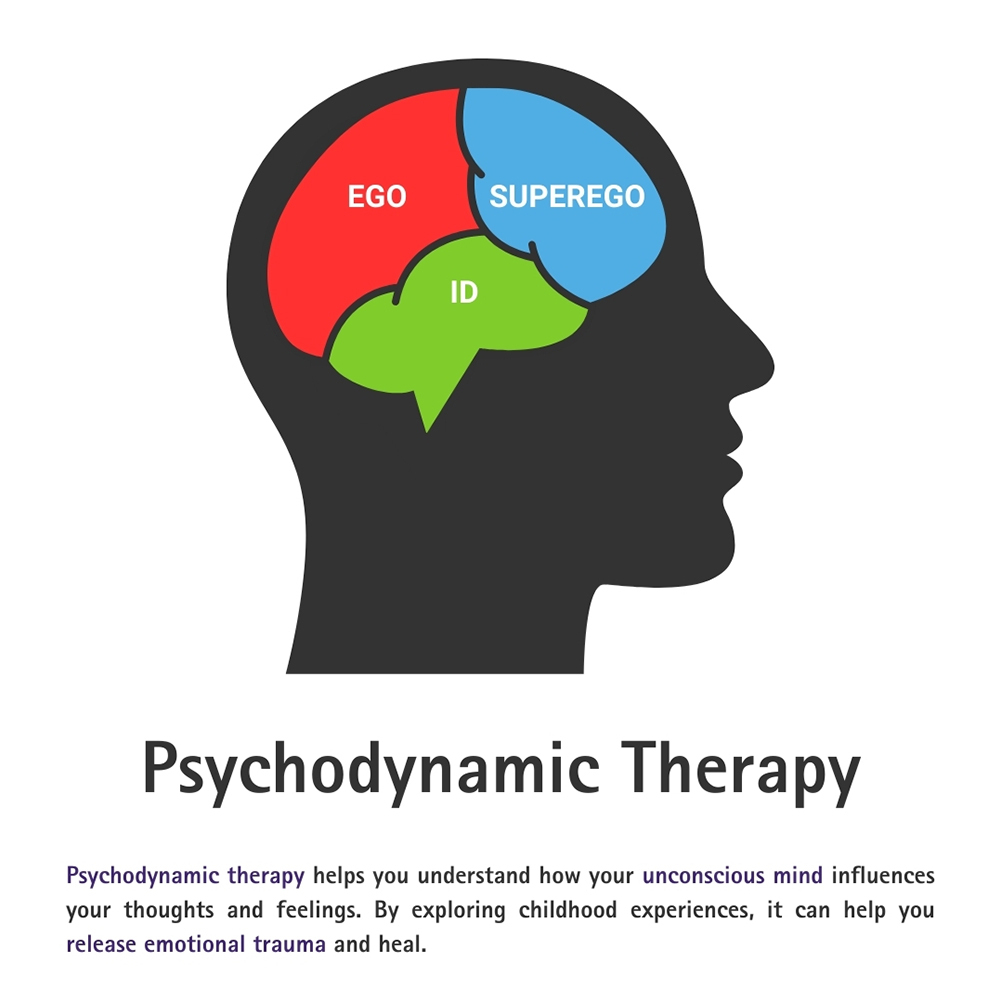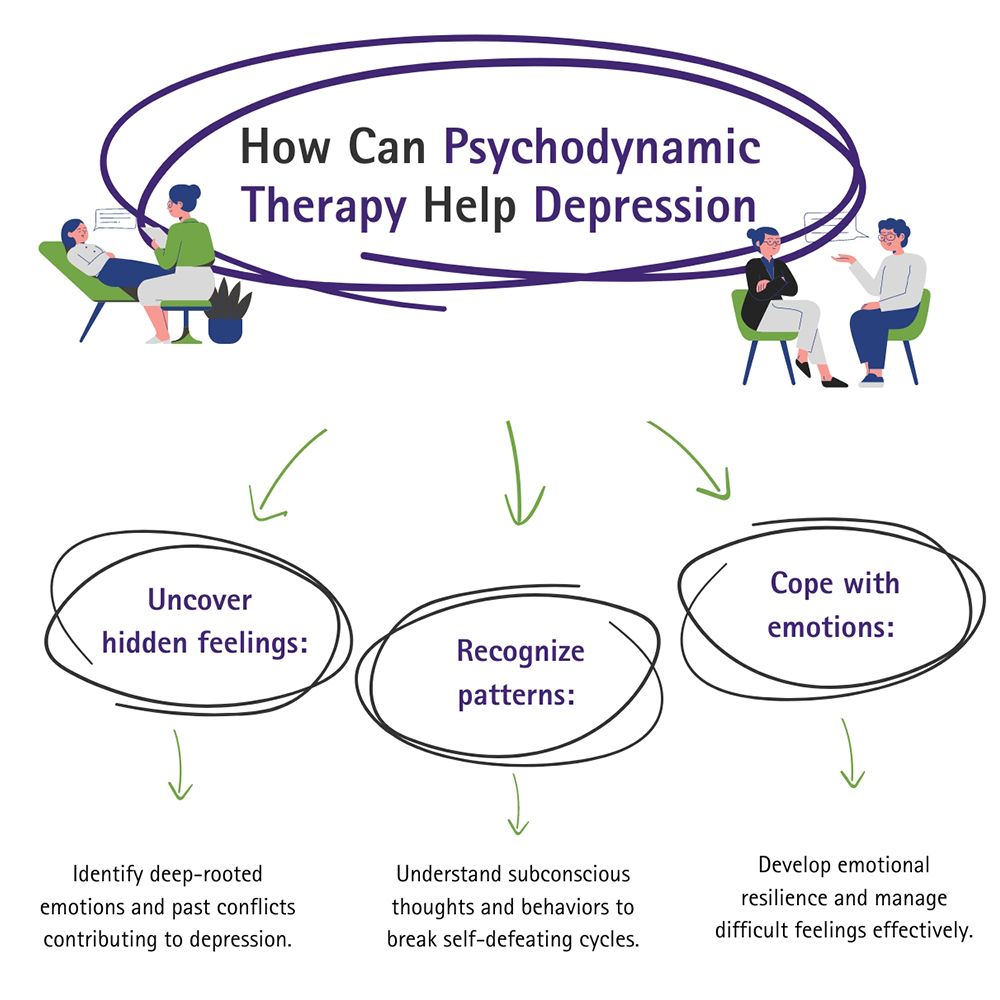What Is Psychodynamic Therapy?
Think of your mind like an iceberg. What you see above the water is just a small part of what’s really going on. The stuff below the surface – your past experiences, buried feelings, old hurts – shapes how you react to things today, even if you don’t realize it.

That’s where psychodynamic therapy comes in. It’s about connecting those dots between your past and present. Maybe you always pick partners who aren’t good for you, or you freeze up during job interviews, or you can’t explain why certain situations make you anxious. We help you understand why.
This type of therapy works especially well for people dealing with trauma, depression, anxiety, or ongoing relationship problems. It’s not about giving you quick fixes – it’s about helping you understand yourself better so you can make lasting changes in your life.
How Does Psychodynamic Therapy Work?

You’ll sit down with your therapist and just… talk. About anything really – what’s bothering you today, a dream you had, or that weird feeling you get when you visit your parents. There’s no script or worksheet. Instead, your therapist listens for patterns.
If you always feel like you’re not good enough, we might trace that back to messages you got as a kid. Or if you have a hard time trusting others, we’ll explore why that started. We look at these hidden patterns together. The cool thing is, once you see these patterns, you can change them.
You get to decide which beliefs you want to keep and which ones you’ve outgrown. It’s like finally getting the keys to your own life – you choose who you want to be and how you want to live. That’s what we work on in psychodynamic therapy.
How Does Modern Psychodynamic Therapy Compare to the Old-School Approach?
Remember those old movies where someone lies on a couch and talks about their dreams while a therapist scribbles notes? That’s the classic approach Freud made famous. It could take years, with sessions multiple times a week.
Today’s version is much more practical. We still care about understanding what makes you tick, but we focus more on what’s happening in your life right now. You might talk about a fight you had with your boss last week rather than spending months analyzing your childhood dreams.
Embrace Healing The Power of Trust in Therapeutic Relationships
“In my experience, the most effective aspect of therapy is the therapeutic relationship. Establishing trust between a client and clinician is the first step to healing.”
Think of it like this: The old way was like doing a full archaeological dig of your past. The modern approach is more like using those insights about your past to solve today’s problems. It’s faster, more flexible, and deals with real-life stuff you’re facing right now.
Does Psychodynamic Therapy Actually Work?
Short answer: Yes. And we’ve got the science to back that up.
People often wonder if talking about their feelings really helps. Turns out, it does – especially with depression, anxiety, trauma, and eating disorders. In fact, research shows it works better than many other approaches. One major study found that people who tried psychodynamic therapy saw three times more improvement than those who only took antidepressants.
Here’s what real results look like: Eight out of ten people reported feeling less depressed after trying this therapy. For anxiety, about seven in ten people felt better compared to trying other types of help.
But numbers only tell part of the story. What matters most is that this therapy helps real people work through real problems. It gives you tools to understand yourself better and make lasting changes in your life.
How Do Psychodynamic Therapists Understand What Makes Us Tick?
Think about how a river shapes a landscape over time. In the same way, your early life experiences carve out patterns in how you see the world and react to it. A psychodynamic therapist is like a guide who helps you trace these rivers back to their source.
They pay attention to the clever ways your mind protects itself. You know those moments when you laugh off something that actually hurts? Or when you always need to be in control? These are clues about what’s really going on underneath.
They also watch how you connect with others – including them. Maybe you find it hard to trust people, or you always end up taking care of everyone else. These patterns usually tell a bigger story.
Even your dreams can offer hints. Not in a fortune-telling way, but as another window into what’s bouncing around in your mind.
The cool thing is, once you understand these patterns, you can start changing them. It’s like finally getting the owner’s manual to your own mind.

How Long Will I Need to Go to Therapy?
Good question – and the honest answer is, it depends. Just like some people go to the gym for a few months to get in shape for summer, while others make it a permanent part of their lifestyle, therapy is different for everyone.
Some folks might find what they need in a few months. Others prefer to dig deeper and stick with it longer. It really comes down to what you’re dealing with and what you want to get out of it.
Think of it this way:
- If you’re working through a specific issue (like a breakup), it might be shorter.
- The most important thing is that you’re comfortable with the pace – this is your journey, after all.
But if you’re untangling patterns you’ve had your whole life, it could take more time.
Best way to know? Talk to your therapist about what you’re hoping to achieve. They can give you a better idea based on your specific situation.
What Can Psychodynamic Therapy Do For Me?
Ever feel like you’re carrying around a backpack full of emotions, but you’re not quite sure where they came from or what to do with them? That’s where this therapy comes in. It helps you unpack that backpack – figure out why you feel the way you feel, and learn better ways to handle those big emotions.
The goal isn’t to erase your past or “fix” you (because you’re not broken). It’s about understanding yourself better so you can make different choices. Sometimes that means making sense of old hurts. Other times it’s about spotting patterns that aren’t working for you anymore.
If you’re curious about trying this out, we’re here at the Trauma Therapy Center in West Palm Beach. No pressure – just reach out when you’re ready. This is your journey, and you get to decide when it’s time to take that first step.

